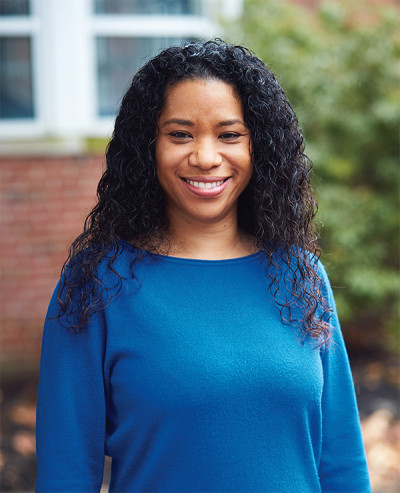
Photo: Pat Piasecki
Angela Randolph, assistant professor of entrepreneurship
Angela Randolph has stopped making five-year plans. The assistant professor of entrepreneurship created many, and checklists, too. Randolph uses checklists to help guide decisions. She is keeping these. But she has realized that life twists and turns too much for five-year plans.
Her path to becoming a professor is anything but straight. Growing up, Randolph enjoyed math and science and was steered by counselors toward engineering for a career. “My parents had no idea what engineering was, and neither did I,” she says. “But then I looked at starting salaries coming out of school, which is just the worst way to pick a major.”
With visions of a high-paying job in her future, she decided to study chemical engineering at the University of Virginia, which offered her a scholarship and was near home. “I hated it,” she says, “but I was too stubborn to drop the major.” Plus she had talked many of her engineering friends who initially had wanted to quit into sticking with it, so when Randolph announced her second semester that she wanted to switch to psychology, they rebelled. She stayed. “After the first year it gets better,” she says of engineering.
Senior year, Randolph took an accounting class for a minor and loved it. Thoughts of getting an MBA started to percolate in her mind, and a new plan began to emerge. But first she decided to follow through on her goal of becoming an engineer and took a job at PepsiCo in its Virginia-based bottling operations. Initially, she enjoyed the work. “Everything was new,” she says. “For me, the fun part is in the chaos. I love to bring order out of chaos. We used to rotate shifts, and I would always volunteer for the shift that was doing the worst.”
Some of the job entailed process enhancements through technology, but most of the improvements that Randolph made were by changing people processes. “I realized I work much better with people,” she says. She knew then that her future was outside of engineering. Eventually, she also became a bit bored with the job. What seemed like a crisis before was no longer a challenge. Randolph decided to earn that MBA, with a plan of working her way into a C-suite executive position at a Fortune 500 company.
Married at the time, she stayed local and went to William & Mary. After finishing her degree, she joined Wachovia Bank, eventually consulting with companies on ways to improve their cash management processes. For more than five years, Randolph worked in banking and traveled extensively. Her clients included CFOs and CEOs, so she felt on track for making the connections she would need for her next professional move.
Life, however, turned her in a different direction. She had a son, and, despite a supportive boss with similar family concerns, travel lost its allure. She also opened a cyber cafe with her husband, but then her marriage fell apart, and so did the business. At the same time, the banking industry was in disarray. When Wachovia began downsizing, Randolph asked her boss to put her name on the list. “She laughed at me,” says Randolph. “I was considered a top performer.” Randolph asked multiple times. Then one day following industry rumors of the bank going under, there was a silent run as clients panicked and pulled their money. More missteps followed, and soon her request to be laid off was granted.
As a single mother trying to figure out her next move, Randolph took a break from full-time work and consulted part time to make ends meet. She no longer aimed to be a C-level executive; she wanted to be home more with her son. Intrigued by entrepreneurship, she considered starting a business that would help new moms who travel to continue breastfeeding, a problem with which she had personal experience. She also thought about earning her PhD. Getting an advanced degree wasn’t a novel idea for Randolph. “I would call schools when I got frustrated at work and ask about programs,” she says. “Everyone has their thing that they do when they have a bad day. I called PhD programs.”
In the end, after researching her options and talking to friends, she decided to follow her dream of earning a PhD. Randolph wanted to focus on management and entrepreneurship, and, with psychology still an interest, perform research in entrepreneurial cognition, basically the study of how entrepreneurs think and make decisions. Mapping out her options, Randolph discovered a perfect fit at Texas Tech University.
While in Texas earning her degree and teaching classes, her life took several more turns. She remarried and had another son. Randolph also created what would be her last five-year plan, mapping out where she would apply for jobs after graduation. “My husband laughed at me because I had everything tiered based on factors such as location, focus, teaching load,” she says. Babson came out on top.
Happily for Randolph, Babson was equally impressed with her, and she began teaching this fall. The Babson culture suits her. “It’s very entrepreneurial, high energy, lots going on,” she says. “People are excited to come to work.”
This year, Randolph is co-teaching “Foundations of Management and Entrepreneurship,” helping students come up with and shape their business ideas as well as understand financing and marketing. “I’m new, so every idea they come up with is awesome,” she says, laughing. “Now the poor students, what they don’t realize is I’m used to tearing apart businesses and saying, you need to fix this, you need to fix that. You need to reconsider this piece.”
With not even a full school year behind her, Randolph isn’t sure yet what other courses she eventually may teach or groups she may join. “There’s so much going on,” she says. “I want to see what opportunities there are and what presents itself. I’ve stopped the five-year plan.”
